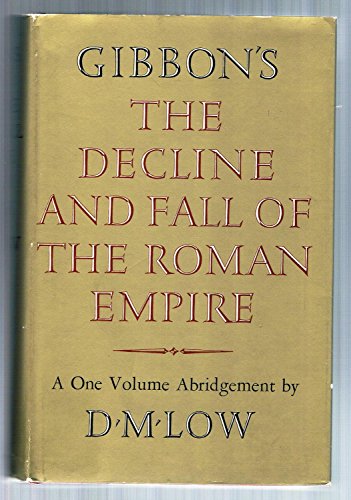The Decline and Fall of the Roman Empire


sku: COM9780151355372USED
ACCORDING TO OUR RECORDS THIS PRODUCT IS NOT AVAILABLE NOW
$8.98
Shipping from: Canada
Description
Gibbon offers an explanation for why the Roman Empire fell, a task made difficult by a lack of comprehensive written sources, though he was not the only historian to tackle the subject. According to Gibbon, the Roman Empire succumbed to barbarian invasions in large part due to the gradual loss of civic virtue among its citizens. They had become weak, outsourcing their duties to defend their Empire to barbarian mercenaries, who then became so numerous and ingrained that they were able to take over the Empire. Romans, he believed, had become effeminate, unwilling to live a tougher, "manly" military lifestyle. In addition, Gibbon argued that Christianity created a belief that a better life existed after death, which fostered an indifference to the present among Roman citizens, thus sapping their desire to sacrifice for the Empire. He also believed its comparative pacifism tended to hamper the traditional Roman martial spirit. Finally, like other Enlightenment thinkers, Gibbon held in contempt the Middle Ages as a priest-ridden, superstitious, dark age. It was not until his own age of reason and rational thought, it was believed, that human history could resume its progress. Gibbon sees the Praetorian Guard as the primary catalyst of the empire's initial decay and eventual collapse, a seed planted by Augustus at the establishment of the empire. He cites repeated examples of the Praetorian Guard abusing their power with calamitous results, including numerous instances of imperial assassination and incessant demands for increased pay.
Price history chart & currency exchange rate
Customers also viewed

$67.63
Dropshipping Pop Winter Jacket Men Thicken Warm Parkas Casual Long Outwear Fur Hooded Collar Jackets and Coats Men veste homme
aliexpress.com
$1.49
Suitable For Iphone 14 13 11 Pro Max Xs Max X Xr 8 7 6 6s Plus 12 Mini Transparent Tpu Shockproof Phone Case
temu.com
$8.37
Polka-dot Print Wide Leg Pants, Casual Elastic Waist Loose Pants For Spring & Summer, Women's Clothing
temu.com
$1,058.40
Wavelength 755nm 808nm 1064nm Permanent Alexandrite Diode Laser Hair Removal Machine Laser Painless Salon Use
aliexpress.com
$9.55
Car Wash Brush Cleaning Tools Mop Long Handle Automatic Chenille Mop Car Accessories Wash Auto Microfiber Foaming Rotating V0b0
aliexpress.com
$0.33
Teeth Cleaner Food Grade Material Soft Fur Toothbrush Kids 360 Degree Round Handle U Shape Baby Dental Care
aliexpress.com
$36.42
AR-X Vr Glasses Virtual Reality Helmet 3d Stereo Head-mounted Giant Screen Cinema Game Machine Ar Glasses
aliexpress.com
$2.76
Горячее сексуальное нижнее белье, женское кружевное нижнее белье, белый бюстгальтер, эротические костюмы, Порно одежда, сексуальный костюм ...
aliexpress.com
$10.68
BraceTop 1 PC Adjustable Thigh Brace Support, Quadriceps Support and Thigh Wrap Breathable Non-Slip Hamstring Compression Sleeve
aliexpress.com
$15.90
Шлепанцы женские прозрачные на высоком каблуке, ПВХ, модные сандалии с кристаллами, сланцы, праздничная обувь-желе, летние Тапочки
aliexpress.com
$10.37
10PCS Stainless Steel Oval Slide Charms Antique Silver Metal Charms Slide Beads for DIY Bracelets Necklace Jewelry Making
aliexpress.com
$14.28
Motorcycle Aluminium Grips Hand Pedal Bike Scooter Handlebar For KAWASAKI ZX7R ZX7RR 1989-2003 2000 2001 2002 Accessories
aliexpress.com
$8.03
Blue Lotus Printed Handbags Japanese Ukiyoe Design Shoulder Bags All-Match Women's Casual Bag Eco Friendly Portable Shopping Bag
aliexpress.com
$82.28
20ss 2021 new kanye west foam printing lucky me i red heart feel sweatshirts kids see ghosts pullover hoodies p70m fz1y, Black
dhgate.com
$47.17
TUHAO размера плюс 4XL 3XL женское элегантное шерстяное пальто Офисные женские туфли 2021 матери осень-зима шерстяное пальто с длинным рукавом бол...
aliexpress.com
$34.31
Jeans Woman Vintage High Waist Pants Fit Young Girls Cute Sunflower Stitching Pattern Autumn Winter Trousers Female Orange
aliexpress.com
$36.15
Electric Scooter Control Board Assembly Dashboard Dispaly Panel Parts Replacement for Ninebot MAX G30
aliexpress.com
$19.64
condole female hollow out cross punk rock heavy metal pu belt female tank cool streetwear club fashion, White
dhgate.com
$31.45
mens casual jeans classic fashion denim trousers in pure black denim trousers for men1, Blue
dhgate.com
$88.11
three tone human hair wefts with lace frontal closure 1b purple pink ombre hair with lace frontal closure 4pcs lot, Black;brown
dhgate.com
$31.88
skinny pu leather pants female lace faux leather pencil trousers women wet look leggings push up high waist elastic plus size, Black;white
dhgate.com












